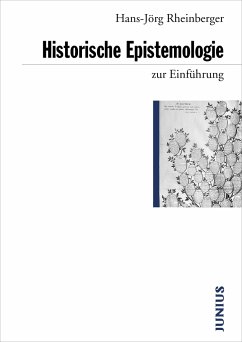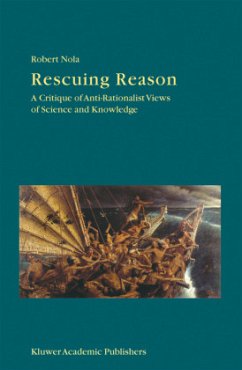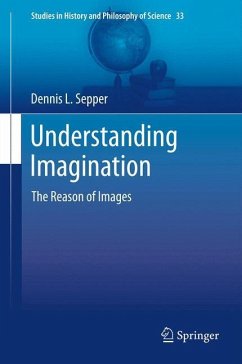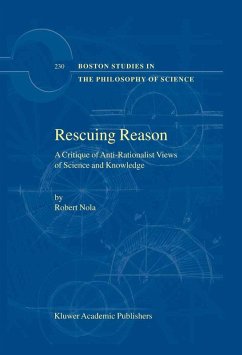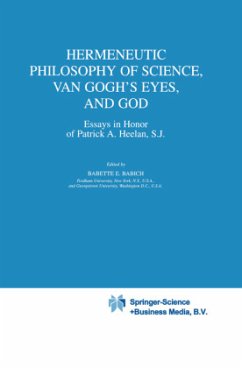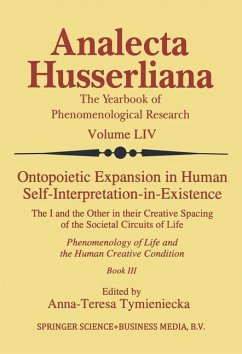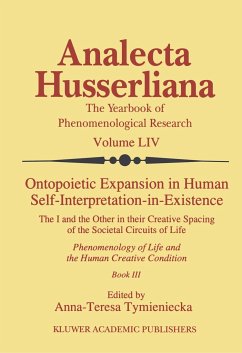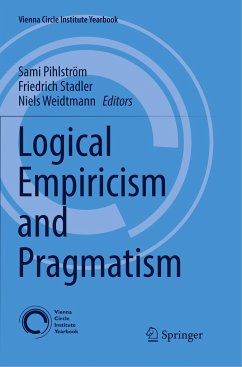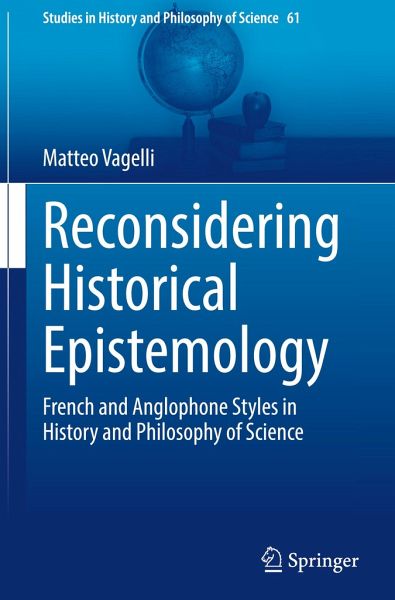
Reconsidering Historical Epistemology
French and Anglophone Styles in History and Philosophy of Science
Versandkostenfrei!
Versandfertig in 6-10 Tagen
76,99 €
inkl. MwSt.
Weitere Ausgaben:

PAYBACK Punkte
38 °P sammeln!
This book explores the key conceptual stakes underpinning historical epistemology. The strong Anglophone interest in historical epistemology, since at least the 1990s, is typically attributed to its simultaneously philosophical and historical synthetic approach to the study of science. Yet this account, considered by critics to be an unreflective assumption, has prevented historical epistemology from developing a clear understanding and definition, especially regarding how precisely historical and philosophical reflections on the sciences should be combined. Thus, this book uniquely analyses h...
This book explores the key conceptual stakes underpinning historical epistemology. The strong Anglophone interest in historical epistemology, since at least the 1990s, is typically attributed to its simultaneously philosophical and historical synthetic approach to the study of science. Yet this account, considered by critics to be an unreflective assumption, has prevented historical epistemology from developing a clear understanding and definition, especially regarding how precisely historical and philosophical reflections on the sciences should be combined. Thus, this book uniquely analyses how the problems and tensions inherent to the contemporary phase of historical epistemology can be clarified by reference to the classical French phase. The archaeological method of Michel Foucault, which draws on and transforms fundamental insights by Gaston Bachelard and Georges Canguilhem, is used to exert an enduring influence on the field especially through the work of Ian Hacking and his philosophical cum historical analyses of styles of scientific reasoning . Though this book is of great value to academic specialists and graduate students, the fact it addresses questions broad in scope ensures it is also relevant to a range of scholars in many disciplines and will provoke discussion among those interested in foundational issues in history and philosophy of science.
Uneasily, the history and philosophy of science have bolstered and undermined each other for all too long. Would history offer nothing but potted episodes to confirm or contradict transhistorical claims about science? Would philosophy dismantle uncritical historicist accounts of scientific discoveries? Historical epistemology offers a more integrated path, at once a history of the present and a philosophy of the past. Matteo Vagelli draws together the insights of the Francophone, Anglophone and Germanophone traditions to give us a sparkling, lucid account of seeing our standards of scientific understanding as developing across time, always asking: how did we come to our standards of demonstration and argument? Peter Galison, Harvard University, USA
In this highly sophisticated synthetic work, Matteo Vagelli provides a very clear and informative history of epistemology and the philosophy and history of science. He makes instructive and subtle distinctions that are often overlooked, and makes full and productive use of Ian Hacking's notion of styles , discerning different ways of doing science, philosophy and history. It is a thoughtful and erudite book that will help a diverse array of scholars become more reflective about their own practices, and more tolerant and curious about other styles of inquiry. (Hasok Chang, Hans Rausing Professor of History and Philosophy of Science, University of Cambridge, UK)
Vagelli s book provides a both unique and uniquely important window into historical epistemology and its relation to contemporaryphilosophy of science. Unique because nowhere else can one find a single work that treats the range of topics that he covers. Uniquely important because Vagelli s clear, concise, and comprehensive survey details key interrelationships among a range of American, British, and European views currently in play regarding historical epistemology and philosophy of science as well as the institutional and intellectual vectors driving their associated epistemological positions Paul Roth, UC Santa Cruz, USA
Uneasily, the history and philosophy of science have bolstered and undermined each other for all too long. Would history offer nothing but potted episodes to confirm or contradict transhistorical claims about science? Would philosophy dismantle uncritical historicist accounts of scientific discoveries? Historical epistemology offers a more integrated path, at once a history of the present and a philosophy of the past. Matteo Vagelli draws together the insights of the Francophone, Anglophone and Germanophone traditions to give us a sparkling, lucid account of seeing our standards of scientific understanding as developing across time, always asking: how did we come to our standards of demonstration and argument? Peter Galison, Harvard University, USA
In this highly sophisticated synthetic work, Matteo Vagelli provides a very clear and informative history of epistemology and the philosophy and history of science. He makes instructive and subtle distinctions that are often overlooked, and makes full and productive use of Ian Hacking's notion of styles , discerning different ways of doing science, philosophy and history. It is a thoughtful and erudite book that will help a diverse array of scholars become more reflective about their own practices, and more tolerant and curious about other styles of inquiry. (Hasok Chang, Hans Rausing Professor of History and Philosophy of Science, University of Cambridge, UK)
Vagelli s book provides a both unique and uniquely important window into historical epistemology and its relation to contemporaryphilosophy of science. Unique because nowhere else can one find a single work that treats the range of topics that he covers. Uniquely important because Vagelli s clear, concise, and comprehensive survey details key interrelationships among a range of American, British, and European views currently in play regarding historical epistemology and philosophy of science as well as the institutional and intellectual vectors driving their associated epistemological positions Paul Roth, UC Santa Cruz, USA




